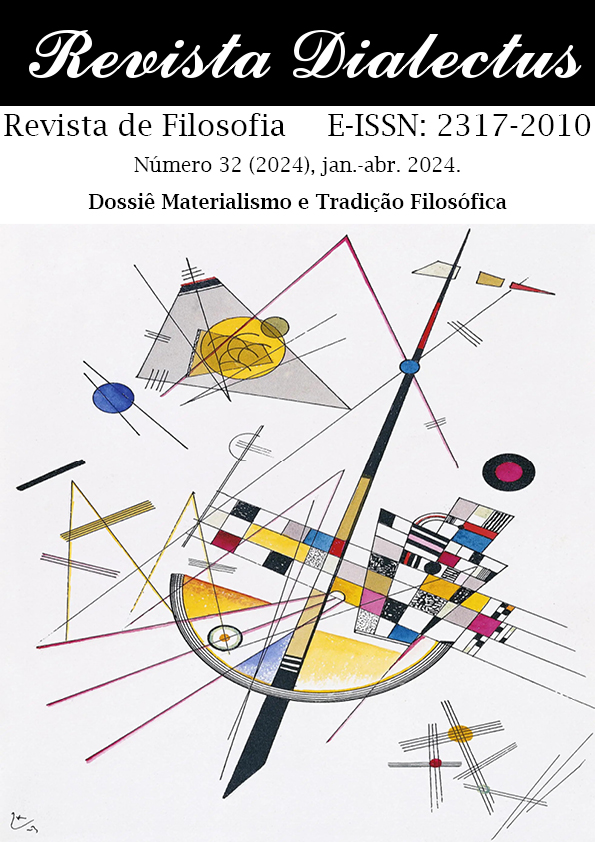NO HORIZONTE DO MATERIALISMO: OS LIMITES ENTRE NATUREZA E CULTURA NA CONCEPÇÃO DE EDUCAÇÃO DE HELVÉTIUS E DIDEROT
DOI:
https://doi.org/10.30611/2024n32id93332Keywords:
Helvétius, Diderot, educação, natureza e culturaAbstract
O presente artigo debruça-se na crítica de Diderot à Helvétius. Apesar da crítica ser feita pontualmente a cada trecho comentado do livro De l’Homme de Helvétius, consideramos que ela possui um núcleo principal, que é a diferente concepção de materialismo dos autores e suas consequências para o que ambos anseiam para a sociedade. Por isso, investigamos o que há no horizonte do materialismo de Helvétius e de Diderot no que concerne à educação e como, apesar de estarem próximos no ponto de partida, o materialismo, seu norte é diferente. A escolha do tema da educação justifica-se por tratar-se de algo que ultrapassa a teorização filosófica e busca inserção prática na sociedade, mostrando assim não só as consequências práticas das teses materialistas como também o ideal de sociedade proposto por cada autor. Aqui, apontamos para as principais diretrizes sobre a construção de uma educação institucional em De l’Esprit (1754) e De l’Homme (1771), de Helvétius, nas Em Reflexions sur le livre De l’Esprit (1877) e Refutations suivre l’ouvrage intitule De l’Homme (1877)1, e em outras obras de Diderot.
1 As críticas reunidas de Diderot foram publicadas apenas postumamente. Estima-se que a segunda, dedicada à De l’Homme foi redigida em um longo período, que coincide com a redação do Plan d’Université (1775) e Elements de Phisiologie (1875).
References
BEILIN, A. Denis Diderot: La culture et l’éducation. Scérén. Paris, 2011.
CHATELET,F. Présentation de “De l’Esprit”. Verviers: Marabout Université, 1973.
DIDEROT,D. Oeuvres complètes de Diderot. Org. J. Assézat [et Maurice Tourneux].Tome II. Ed. J. Claye. Paris. 1875-1877.
_______. O sobrinho de Rameau, Diálogo entre D‟Alembert e Diderot, O sonho de D‟Alembert, Continuação do Diálogo, Suplemento à Viagem de Bougainville, Paradoxo sobre o comediante, Dos autores e dos críticos. In: Diderot. Trad. Marilena Chaui. (Col. "Os Pensadores").São Paulo: Abril. 1973.
_______. Plano de Universidade. In: Obras I- Filosofia e Política. Tradução: Guinsburg. Perspectiva. São Paulo. 2000.
HELVÉTIUS, C-A. De l'Homme. Paris: Fayard. 1989.
_______. Do Espírito. Coleção Os Pensadores. São Paulo: Abril Cultural. 1973.
_______. Le vrai sens du Systéme de la nature In : Oeuvres completes de M. Helvetius. Tome premier [-quatrieme]. 1777.
MARUYAMA, N. A moral e a filosofia política de Helvétius: uma discussão com J.-J Rousseau. São Paulo: Humanitas. 2005.
MESROBIAN, A. Les conceptions pédagogiques de Diderot. Université de Paris. Faculté des lettres. 1913.
Downloads
Published
Issue
Section
License
Copyright (c) 2024 Camila Sant’Ana Vieira Ferraz Milek

This work is licensed under a Creative Commons Attribution-NonCommercial-NoDerivatives 4.0 International License.
Authors who publish in this journal agree to the following terms:
- Authors retain the copyright and grant the journal the right of first publication, with the work simultaneously licensed under the Attribution-NonCommercial-NoDerivatives 4.0 International (CC BY-NC-ND 4.0) License, which allows the non-commercial sharing of work, without modifications and with acknowledgment of authorship and initial publication in this journal.
- Authors are authorized to take additional contracts separately, for non-exclusive distribution of the version of the work published in this journal (eg publish in institutional repository or as a book chapter), with acknowledgment of authorship and initial publication in this journal.
- Authors are allowed and encouraged to publish and distribute their work online (eg in institutional repositories or on their personal page) at any point before or during the editorial process, as this can generate productive changes as well as increase the impact and citation of published work (See The Free Access Effect).



















